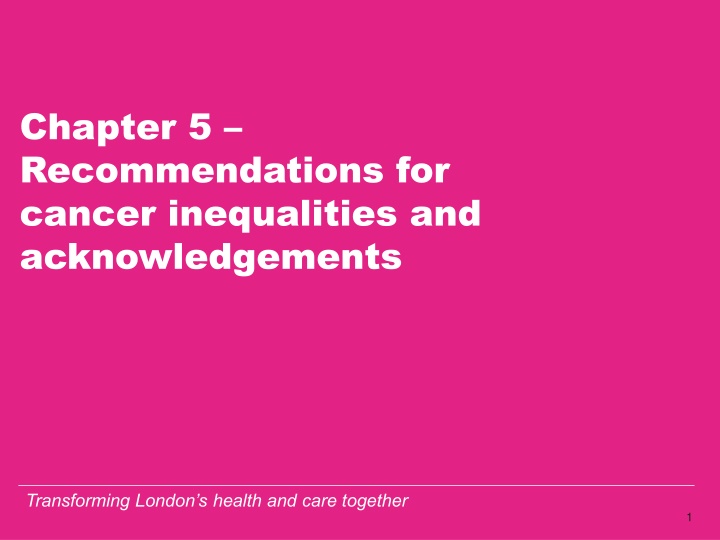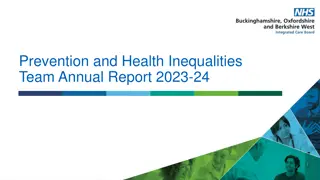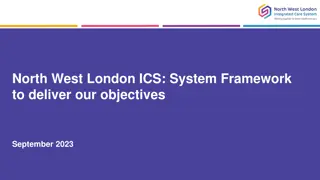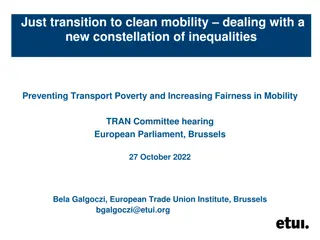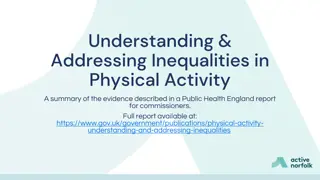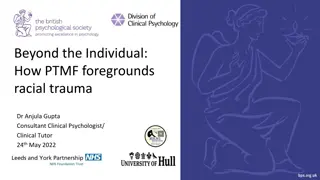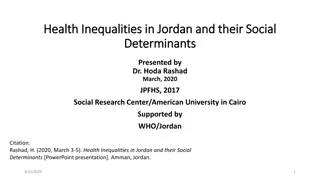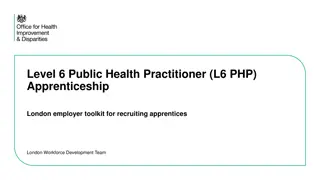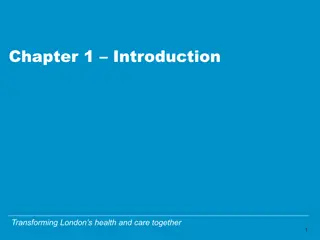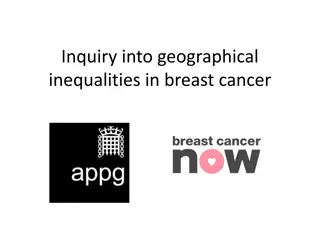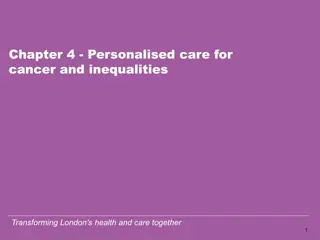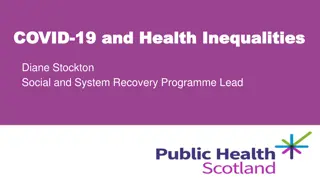Recommendations for Addressing Health Inequalities in London
This chapter outlines recommendations to address health disparities in London, focusing on substance misuse, mental health, learning disabilities, homelessness, prisons, vulnerable women, undocumented migrants, and the LGBT+ community. Key suggestions include providing alcohol support teams in acute trusts, promoting annual health checks for learning disabilities, ensuring accessible care for homeless individuals and prisoners, and inclusive healthcare policies for vulnerable populations like undocumented migrants and LGBT+ individuals.
Download Presentation

Please find below an Image/Link to download the presentation.
The content on the website is provided AS IS for your information and personal use only. It may not be sold, licensed, or shared on other websites without obtaining consent from the author.If you encounter any issues during the download, it is possible that the publisher has removed the file from their server.
You are allowed to download the files provided on this website for personal or commercial use, subject to the condition that they are used lawfully. All files are the property of their respective owners.
The content on the website is provided AS IS for your information and personal use only. It may not be sold, licensed, or shared on other websites without obtaining consent from the author.
E N D
Presentation Transcript
Chapter 5 Recommendations for cancer inequalities and acknowledgements Transforming London s health and care together 1
Recommendations: substance misuse and mental health Drugs and alcohol and mental health All acute trusts to have an alcohol support team/ward based alcohol advice with link in to community services. All mental health clients to be offered alcohol support and stop smoking support in the mental health trust. All addiction and mental health services to review the physical health of their clients and ensure GPs have detailed guidance for the annual physical health check, including cancer screening. Provide joined up Gastroenterology/addiction services to prevent, detect and treat cancers related to alcohol or intravenous drug use. Roll out liver ultrasound scans for all substance misuse patients to pick up early liver disease. Ensure substance misuse and mental health clients have their hepatitis B vaccinations, and harm minimisation support. Lead 1 2 3 2
Recommendations: learning disability Learning Disability (LD) Annual check for learning disability (LD) - better coding for learning disability in, GP practices (primary care) so that people are offered their annual check. Find better ways to incentivise the annual check by simplifying it / including it on Quality and Outcomes Framework (QOF) register. Think about ways to use the annual check to reduce risks by addressing risks such as smoking. Make secondary care adjustments to screening, investigations and treatment to make it LD accessible. Use the LD workforce in CCGs to help people get to screening, including forewarning secondary care on two-week wait forms in order to make reasonable adjustments. Provide Hepatitis B vaccinations for all residents and staff in LD care homes (as per Green Book guidance) to prevent liver cancer in future Lead 4 5 6 3
Recommendations Homeless, prisons, vulnerable women Homeless Set up clear discharge processes for homeless persons, between acute/cancer care/social care/housing departments/substance misuse teams. Ensure that people with complex social/medical issues and cancer have intermediate and end of life accommodation with nursing care. Prisons Ensure that GMS1 registration able to be completed whilst still in prison in order to then complete the registration with a GP in the community. Vulnerable women Allow vulnerable women and sex workers to have their cervical screening at more convenient venue e.g. in GUM and Family Planning clinics, not just at their GP surgery. Lead 7 8 9 4
Recommendations undocumented migrants, LGBT+ Undocumented migrants Ensure that undocumented migrants can register with a GP. Once registered, invite for screening. Ensure all GPs know how to make cancer two-week wait referrals without using ERS system. Educate Haematology/Oncology/Palliative care doctors about Overseas visitor manager system and that they shouldn't delay urgent/immediately necessary treatment. If the person is eligible for charging, then treatment shouldn't be delayed waiting for upfront payment. LGBT+ Roll out Pride in Practice - to ensure all staff understand that people coming for screening may present in all different ways. Use EMIS/SystmOne to flag transgender patients to ensure they are offered the right cancer screening. Monitoring - ask question regarding sexual orientation and transgender status in new patient forms. Lead 10 11 12 13 14 15 5
Recommendations screening and access (ED) Screening Make screening invitations easy to attend: e.g. in Family Planning or GU not just GP practices; Make screening invitations easy to accept: multi-lingual written materials, friendly callers in own language for people not attending, understand and pitch invitations to attract different communities, using community leaders where possible. Make screening simpler for all marginalised groups - using FIT testing, HPV self sampling and incentives if possible. Lead See London screening improvement board priorities Improve access to screening Address behavioural barriers to non- participation of screening 16 17 See London screening improvement board priorities Targeted work to reduce inequalities Access If emergency presentations are more common in ethnic minority patients address difficulties getting a GP appointment in areas with high deprivation/BME groups Education: Consider cancer in older patients with 18 6 19
Recommendations treatment and personalised care Treatment Review the access to breast conserving surgery and CNSs in older women in London. Consider travel costs for cancer patients refresh visibility in hospital clinics of this scheme Personalised care Ensure primary care registers are up to date, so that primary care can support all people following a cancer diagnosis Populate the cancer care map so that GPs and patients know how to access local services/support Ensure equal access to rehab: including all trusts have psychosocial offer equitable lymphoedema commissioning and provision in order to prevent more costly worsening of the conditions Holistic care of patients Provide appropriate wigs and prostheses for Black and minority ethnic patients Lead 20 21 22 23 24 25 7
Acknowledgements Dr Nicola Lang & Dr Sophie Jose, with Judith Shankleman, Julie Lees, Jason Petit, Chipo Chirewa & Debs McNeill Academics: Dr E Davies, Dr S Duffy, Dr A Kaushal, Dr Al Story, Prof I Basnett, Dr R Alldridge Many thanks to all the TCST team and: Macmillan: Zahra Wynne, Nadine Kennedy, Zereen Rahman Jennings, Dr A Cunliffe Cancer alliances in London and West Essex: Naser Turabi, Dr Donna Chung, Fanta Bojang, Dr Mick Peake, Sharon Cavanaugh, Nicola Hunt, Dr K Haire Third sector: Heather Harvey, Lawrie Roberts, S Meagher, Aimee Linfield, Imogen Pinnell, Cancer Haircare STP Cancer leads: Claire Wilson, Sandra Dyer, Sarah Galbraith, Nimika Patel, Mel Ridge, Ed Nkrumah, Paul Sinden, Sue Maughn, Sara Astbury, Kate Kavanagh Equality and Diversity: Kaz Obuka, Shareen Pavaday, Alice Simon Experts by experience thanks to individuals and all Patient Advisory Group members GPs: Dr Lance Saker, Dr Christine Moss, Dr Katherine Taylor, Dr Kamilla Kamaruddin, Dr Nikki Payne, Dr Caroline Shulman Mental health: Dr E Beveridge, Remi Weslowski, Ellian Fairbairn, Ofra Koffman Addiction: Dr D Shah-Armon, Jody Lombardi Prisons: Simone Thorn Heathcock, Michelle Storer Cancer nursing: Sarah Adomah PHE: Dr J Ruwende ADPH: Jo Chambers Councils: Tony Al-Hosri. J Shankleman 8
List of abbreviations BBV CCG eHNA Blood borne virus Clinical commissioning group electronic health needs assessment electronic referral system Gastrointestinal General medical services GP NCL NCPES National cancer patient experience survey NEL North East London NWL North West London Office for National Statistics (ONS) Public Health England Fingertips data SEL South East London STP Sustainability and transformation partnership SWL South West London TA Temporary accommodation TCST Transforming cancer services team 2WW Two week wait North Central London eRS GI GMS1 contract GP HPV IVDU LD LTP NCIN Network General Practitioner Human papilloma virus Intravenous drug user Learning disability NHS Long Term Plan (2019) National Cancer Intelligence 9
